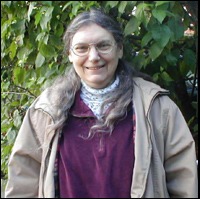Editor’s Note: A version of this article was previously published on the website of The Gifted Resource Center of New England, and is reprinted here by permission of the author.
If a man does not keep pace with his companions, perhaps it is because he hears a different drummer. Let him step to the music which he hears, however measured or far away. You may recognize the words of Thoreau, the quintessential divergent thinker of the nineteenth century.
Every so often we hear about someone who has taken an extraordinary stand about a belief in the face of what would seem to be all common sense. Why would someone go to jail for a belief? Isn’t it better to just go along with things and not cause trouble? After all, look what happened to Galileo.
Nurtured on tales about saints and heroes who gave up their lives for their beliefs, one might come to see that such people have exceptional passion and courage, and a very strong will. Dedication to the belief and what it represents may bring the courage to act on it. However, rarely do we wonder where the belief came from in the first place, and how it developed into a system of belief that is then acted on with such passion.
When an idea develops, it is counter to the status quo. For example, the ideas in the Declaration of Independence were radical thoughts for their time. They arose from extremely radical writings by Thomas Paine and the Sons of Liberty. These in turn were based on writings of earlier philosophers. Today we accept these ideas as part of our heritage: they have become the status quo.
History is full of divergent thinkers. Thoreau and his unusual ideas about freedom and responsibility have yet to become the status quo, but the ideas of others have changed the very way we view reality. For example, while we view Thoreau as a divergent thinker, we might not think of Einstein in quite the same way. Yet, because of his thinking, fundamental tenets about the universe have changed. In his own way, Einstein was a much greater threat to the status quo than Thoreau could ever be.
Divergent thinkers come in both adult and child sizes. Some are obvious eccentrics, but others are so quiet that one would never suspect—until they share their opinion about something.
Divergent thinkers tend not to think first of the most commonplace response; many do not seem to understand how to conform. Often they start off thinking they are just like everyone else, but at some point discover this is not the case. This first awareness often occurs in school.
Divergent thinkers have a real preference for unusual, original, and idiosyncratic responses. They are different in what they think about, and how they express this difference. Some can turn off the divergent thinking at times, but others cannot.
Divergent thinkers can be exceptionally creative. If the ability to think divergently is related to being creative, then all creative people are divergent thinkers, but not the other way around. It’s the ability to direct the divergent ideas into something else that makes a person creative. Creativity is not just making something, though. It can also be the process of enabling others to see one’s vision of how things ought to be. All great philosophers are divergent thinkers, and many of those who protest injustice. What motivates the action taken to protest injustice though determines whether the divergent thinker turns out to be a Gandhi or a Unabomber.
People who are divergent thinkers are novel thinkers. This means that they do not first think of the common assumptions most others use in making decisions. Because they think differently, they act differently. What seems to be common sense to most people does not seem so to the divergent thinker.
Being a divergent thinker irritates and upsets other people who often feel the divergent one should sit down and shut up, and wonder why he or she can’t just be like everyone else. It does not occur to most people that the divergent thinker can’t stop being divergent. In fact, it might not matter if he or she did sit down and shut up—everyone would still know how the divergent thinker felt. One cannot blend into a crowd if the crowd is so different from oneself that it is not camouflage. It’s like trying to hide an elephant in a flock of chickens by telling the elephant to squat down and cluck a lot.
One cannot blend into a crowd if the crowd is so different from oneself that it is not camouflage. It’s like trying to hide an elephant in a flock of chickens by telling the elephant to squat down and cluck a lot.

People have trouble with divergent thinkers because the essence of divergent thinking is rebellion. While we might admire the person who stands up for his or her beliefs to the government, who goes to work in a relief agency abroad and gives up the good life here, or who creates a wonderful piece of art, we rarely admire the divergent thinking child or adolescent who wants to say “No.” Divergent thinkers cannot accept authority just because it exists, as other people do. They need to test it out for themselves, to find out if it is true. This does not mean a lifelong bad attitude about authority. Creative rebellion is not about confronting rules, but about confronting ideas. This distinction is difficult for most young people to make, so they challenge rules too.
Divergent thinkers cannot accept authority just because it exists, as other people do. They need to test it out for themselves, to find out if it is true. Creative rebellion is not about confronting rules, but about confronting ideas.
It is particularly hard to be a divergent thinker when a child. While adults may value the finished creative product, they rarely value the rebellion necessary to create the product. Yet, to be original means looking beyond what is commonly accepted. Most adults, especially those in authority, would prefer divergent thinkers to turn it off except when creating in very circumscribed ways, for example for a set topic they have assigned.
Divergent thinking children have a number of particular learning problems that are rarely recognized. For one thing, they are often immersion learners. This means that they learn best by immersing themselves in their passion and working only on that passion until it is done. They see ordinary tasks as interference with their creative time. For example, exceptionally talented young painters or writers often only want to paint or write and do nothing else. Homework is a waste of time to this sort of student.
The thoughts, impressions, and feelings of divergent thinkers are interconnected. Some have trouble with organizing thoughts or starting a project just because they cannot set priorities since everything is interconnected. It appears to them as if there were no good starting place and that no one piece can be used without all other pieces. This makes step-by-step learning—the type of learning expected in most schools—difficult for these young people. Since they cannot turn off their thinking to conform to the teacher’s way of doing things, they are less apt to get good grades than other children even if they are extremely intelligent. In fact, step-by-step learning makes no sense to them, since the material, as presented, has no connection to other parts. In a regular school academic program, these elephant children feel as if they are being fed one blade of grass at a time. They never get enough to fill them up and starve to death as a result.
In addition, the divergent thinker in school, particularly in the upper grades, has trouble with analysis of material. Often this skill is taught in junior high and high school by having the student read a work and find the parts the teacher thinks are important or that the curriculum guide has selected as valuable. Divergent thinkers may be original in their analyses, but they do not come up with teacher approved insights. Many really do not see or understand what the teacher wants, and cannot produce it. Others may understand what the teacher wants but feel that they cannot give that answer because it is not honestly their own opinion. One of the problems for many such students is asking for their own opinion in contexts that really want a particular point of view for an answer.

Divergent thinking students may see different interconnections between the assigned material and other material than does the teacher or classmates. Original ideas are labeled as “wrong” for these students. Some write papers based on these wrong opinions or go off on interesting tangents. They then find themselves marked down for not keeping to the point. To the student it comes to feel as if no one values their true feelings or thoughts, and that no matter what education is supposed to be, only “right” answers count. To them, the most valuable parts of themselves do not count, are not valued, and are actively criticized.
The divergent thinker is a unique self. If he or she can find value in uniqueness and some tolerance from society, a strong sense of self can develop. In fact, if we consider a self/society dichotomy, the stronger a person’s tendency toward divergent thinking, the more likely he or she is to find a unique self. And at the same time, unfortunately, the more likely he or she is to have to hide it. Because of the way society views conformity, girls who are highly divergent and creative are often at special risk for social censure and isolation. Many retreat into books, or develop a “thorny” exterior in order to hide their vulnerability to social rejection.
The stronger a person’s tendency toward divergent thinking, the more likely he or she is to find a unique self. And at the same time, unfortunately, the more likely he or she is to have to hide it.
Children who are extreme divergent thinkers tend to have emotional issues related to feeling different. Both self-image and interconnectedness to others can be problematic. These children can feel entirely alone, with no one to understand them, and they are at risk for depression and other emotional disturbances.
The goal of parents, teachers, and counselors should be to help the child find some validation for the different self, while helping him or her to learn how to handle living in a less than appreciative world. Since, to the child, their ideas, feelings, and capabilities are essential to their unique self, valuing these things means the child feels wholly valued. This helps the divergently thinking child to feel connected to at least some people, and to feel at least sometimes understood. If they lack such acceptance, children may not feel that anyone truly cares about them, and this perceived rejection can be a source of great stress.
The long-term task for divergent thinkers is to find a work to love, to develop a sense of self that the person can like and trust even if few others do, and to find some sources of validation that do not depend on conformity to an outside standard. To find and mold a suitable home and school environment—one that nurtures the person as well as the talents—is an important goal for these children.
It is not easy to be a divergent thinker in a conformist society. But thorns and all, the divergent thinkers are the ones who cause change to occur. We need their ideas and their passion, but it is up to us what use we make of them. Divergent thinkers can give us the keys to the universe, and the keys to world destruction. What is done with either is up to the status quo.




